San Diego Unified School Board Race: The Big Picture

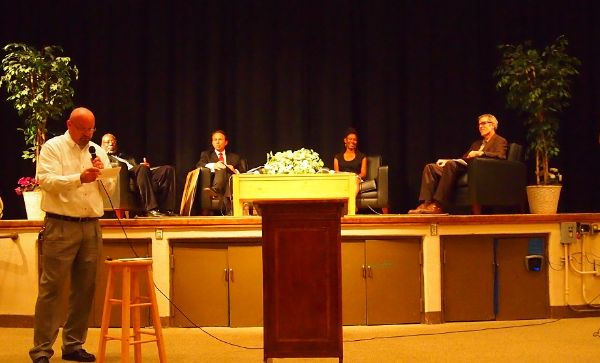
For the San Diego Unified School District (SDUSD), this election cycle presents unprecedented variables that factor into the future of its schools. The passage or failure of Propositions 30 and 38 will present the school board with different sets of challenges. Two seats are up for grabs in SDUSD's school board race. The district may or may not see and a much different picture after November 6.
School districts around California await voters' decision on Proposition 30. Concessions with faculty and/or further budget cuts have been options but educational leaders are hard-pressed to shrink a budget that has been shrinking for several years.
Dr. John Lee Evans, current SDUSD Board President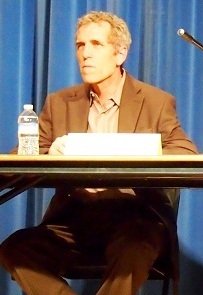
SDUSD board candidate Dr. John Lee Evans led negotiations on a cost-saving agreement with the teacher's union earlier this year to rescind 1,500 faculty member layoffs. In a debate, he responded to a question about what the district can do if California's education funding propositions do not pass:
"It's not simple as class size or number of days of school because if we eliminate certain teachers, it disproportionately effects schools of higher poverty. With the layoffs that we were contemplating, Fay Elementary was going to lose 26 out of 28 teachers. Central Elementary was going to lose half of their teachers.While some will think it's better to have more school days and a few more students in their classroom, we were looking at dramatically increased class sizes and we were also looking at the instability of the schools of higher poverty.We really have to, if propositions fail, sit down and negotiate concessions with teachers again. We have to balance out the situation. It's not as simple as number of days or class sizes, we really have to find a balance."
Dr. Evans' opponent, Mark Powell, is critical of the school board decisions. Powell is a strong advocate for a higher number of school days. He states, "I can guarantee you that it'll be difficult to educate students in larger classes, but 100-percent sure if they're not in a class, they won't get educated." As part of the cost saving agreement, five furlough days were added to the 2012-2013 school year. If Proposition 30 does not pass, an additional fourteen days will be cut from the school year.
At every debate during the school board race, Powell brought up a comparison of school days around the world:
"Currently the United States is one of the lowest school years in the developed world: Switzerland has 228 days, Korea has 220 days, Australia has 200 days.We can't afford to undermine our children's education by making them less competitive with other countries. We're going into a global economy. A time-challenged curriculum has to be condensed to 161 days."Mark Powell
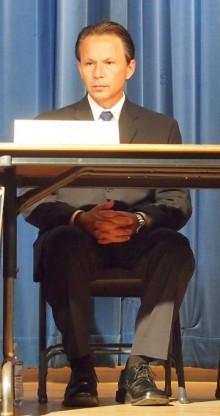
Mark Powell proposes, like the other candidates, to cut down on top-heavy administration in budget crisis. He admits that he is unable to know how much he would cut, seeing as how he is not of the board and doesn't have access to necessary information. Overall, Powell says that problems within the school system boil down to leadership.
All around the country, teaching-to-the-test is faced with criticism. Parents expect more from schools and SDUSD has attempted to move to a more expansive curriculum. Dr. John Lee Evans is the author of Vision 2020, SDUSD's plan to expand its schools' learning implemented in 2009.
Vision 2020 attempts to establish a broad and challenging curriculum to stimulate critical thinking. Critics say that there isn't a solid or finite measurement of success through Vision 2020. However, the school district is relying on community-based reform measures which emphasize teacher and peer collaboration. If a class is under-performing, fellow teachers come together to improve the class. When drafting the plan, Dr. John Lee Evans stated:
"We didn't just say 'what is No-Child-Left-Behind and the state requiring of us?' We said 'what do we want our students to learn, how are we going to define student achievement and how are we going to measure it?' I know that when parents are sending kids to school their not just asking 'what are the test scores of the school'. They look for various factors.We have our schools focusing on critical thinking. We don't want our students to grow up to be robots, listening to Fox News or MSNBC, swallowing it whole without any critical thinking in terms of what's going on. We are in an information age and there are tons of information, but we have to know how to sift through that information and think critically about it."
In the past four years, SDUSD has seen an overall increase in standardized test scores in all subjects. The current board attributes the test score success as a bi-product of their community-based reforms. However, there is still inequality among neighborhoods within SDUSD. Dr. Evans will be the first to note that there still needs to be improvement, but providing a stable budget would build a platform for schools to improve.
William Ponder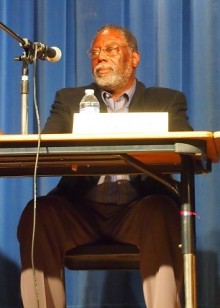
William Ponder looks to the district's collective bargaining agreement. Deemed an education reformer, Ponder wants to change the system from the inside. He is a critic of Vision 2020, saying it lacks the ability to be quantified. He also points out that specific communities within San Diego have "built-in inequities," because of the lack of resource allocation. One school within sub-district E, Lincoln High School, has issues with teacher stability. Ponder says:
"Because of the structure of the current collective bargaining agreement, you have about 40 teachers looking for a transfer and they're still at the school. We have teachers who are there who do not want to be there.Part of the solution is that we need to talk to parents and teachers and look at school by school. We need to focus on what is in the best interest of the children at that school."Marne Foster
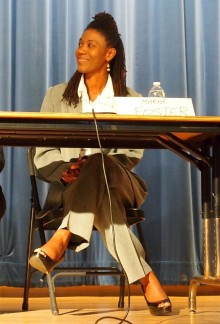
Candidate Marne Foster offers to reach outside organizations to establish partnerships. The idea is to expand opportunities for schools to enrich education in hopes of improving achievement. In the case of budget shortfalls and shortened school years, partnerships can help fill the void. She advocates:
"Building a capacity to partner with assistant programs that provide resources we need. For example, the YMCA has pools and wonderful computer labs. There are other programs such as Boys to Men leadership academy, and Reality Changers that have proven to be extremely successful in garnering millions of dollars in scholarships."
Mark Powell would agree to build relationships with non-profit organizations. He previously mentioned that his former school of Correia Middle, where he was Vice Principal, could use a land-share agreement with the neighboring YMCA.
Marne Foster also goes into how student achievement can be measured in a critical thinking aspect:
"We don’t want teachers teaching to the test, we also want to look at student portfolios, samples of their work and presentations. Students are able to demonstrate that they’ve mastered necessary skills. They can talk about trigonometry or English arts. They can talk about The Crucible and relate it to real-life, so the curriculum is relevant and engaging for young people."
The San Diego Unified School District is also pushing for a bond measure, known as Proposition Z. It is a 2.8 billion school bond for infrastructure renovations and technology. While it is a bond for SDUSD schools, it would provide unprecedented support for charter schools. However, Powell and Ponder are both opposing the measure. Both candidates state that the bond measure will end up costing much more than it should with interest paid back on the bonds. Powell points to the bond controversy of Poway Unified where a bond measure would have to be paid back at a ratio of ten-to-one. High-interest capital appreciation bonds are the concern, but there is no telling now what the interest on Proposition Z bonds would be.
Much of what's been said has been said in previous posts. But it's important to take a step back, put the pieces together, and see how all the issues and proposed solutions fit into a picture that would be the SDUSD school board. San Diego may or may not be the model public school district that the state or nation could look to as an example for success in dire times. There's no doubt that our school leaders want that to happen, but voters have to take note of what they believe is the best path to become a model school district.
United States Secretary of Education Arne Duncan testified before the Senate Labor, Health and Human Services and Education Appropriations Subcommittee in July 2012. Secretary Duncan challenged the notion of federal budget sequestration which would impact federal education funding. In his testimony, he stated: "The biggest impact in K-12 education will be felt starting in the fall of 2013. In a recent poll of school district leaders, 80 percent of them said they would not be able to use state and local funding to replace lost federal funds."
The SDUSD budget published for last academic year stated, "the District is estimating to receive over $57 million less in Federal funding in 2011-12. Reductions in the federal budget will adversely impact many of our most at-risk students."
The status quo is susceptible to criticism, but critics are short on solutions. The issues that San Diego Unified face echoes throughout out the state and country. Finding a balance or deciding the elements to eliminate from the school system in reaction to budget cuts are frequent stories. California education in particular may look much different after November 6, depending on the outcome of its education-funding propositions 30 and 38.
Closing achievement gaps and improving under-performance of schools are a national challenge. San Diego Unified and its school board race are microcosms of the state of education in the country.
For Past Coverage of the San Diego Unified School Board Race:
An Overview of the San Diego School Board Race
San Diego School Board Candidates on Budget Issues
San Diego School Board Candidates on Parent Involvement
The State of the District Address from Dr. John Lee Evans
Marne Foster on Improving the San Diego Unified School District
William Ponder on Reforming San Diego Schools
Dr. John Lee Evans and Mark Powell are competing for the SDUSD school board to represent sub-district A. Marne Foster and William Ponder are competing to represent sub-district E.



